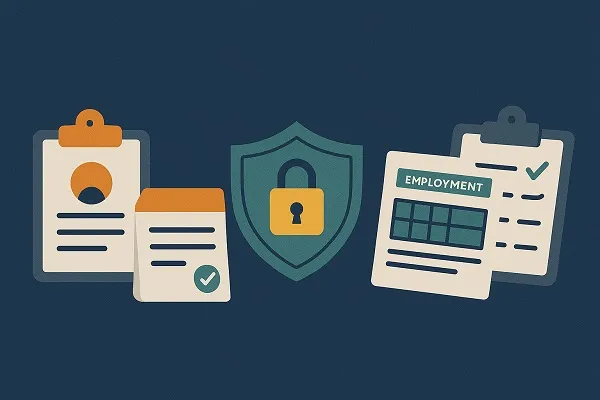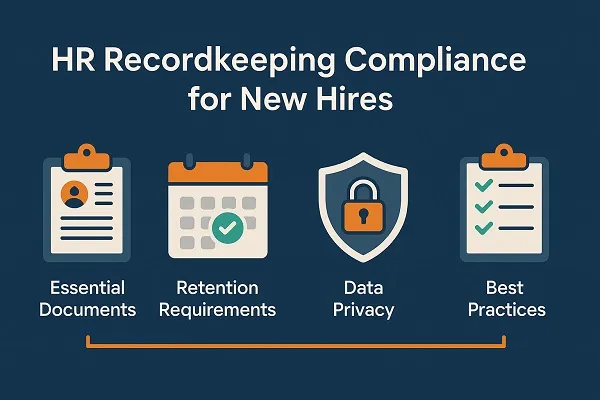HR recordkeeping compliance for new hires is a critical responsibility for every employer. From the moment a candidate accepts an offer, businesses are required by law to maintain accurate employee records. Proper documentation not only ensures compliance with federal and state regulations but also helps protect the organization from costly penalties and legal risks.
Why HR Recordkeeping Compliance Matters
Employee recordkeeping is not just an administrative task—it is a compliance obligation. Regulations such as the Fair Labor Standards Act (FLSA), Equal Employment Opportunity Commission (EEOC) requirements, and the Immigration Reform and Control Act (IRCA) mandate that employers keep specific records.
Failing to comply with recordkeeping standards can lead to:
- Significant fines and penalties
- Legal disputes and lawsuits
- Increased risk during audits
- Damage to employer reputation
Essential HR Documents for New Hires

When onboarding a new hire, employers must collect and maintain key records. These documents serve as proof of compliance and safeguard the company in case of disputes.
Core Employment Records
- Job Application and Resume – Keep all documents related to the hiring process.
- Offer Letter and Employment Agreement – Contracts and terms of employment must be on file.
- Tax Forms (W-4, state equivalents) – Required for payroll and tax compliance.
- I-9 Form – Proof of eligibility to work in the U.S., with strict retention rules.
Additional Employee Records
- Emergency Contact Information
- Acknowledgment of Company Policies (handbook, code of conduct)
- Benefits Enrollment Forms
- Non-Disclosure or Confidentiality Agreements
Legal Requirements for Record Retention
HR departments must know how long to keep employee records. Different laws establish specific timeframes, and retention schedules vary by document type.
Federal Retention Guidelines
- I-9 Forms – Maintain for 3 years after hire or 1 year after termination, whichever is later.
- Payroll Records (FLSA) – At least 3 years.
- EEO Records – Typically 1 year, or longer if a complaint is filed.
- Family and Medical Leave Act (FMLA) Records – Minimum of 3 years.
Best Practices
- Maintain both physical and digital copies.
- Use secure systems to protect sensitive data.
- Create a retention policy and train HR staff to follow it consistently.
Compliance with Data Privacy Laws
Recordkeeping is not just about storing documents—it’s also about protecting employee information. HR teams must comply with data privacy regulations such as the Health Insurance Portability and Accountability Act (HIPAA) and, in some cases, the General Data Protection Regulation (GDPR).
Key steps for compliance include:
- Restrict access to sensitive files.
- Encrypt digital records.
- Implement secure disposal methods for outdated records.
- Regularly review compliance policies.
Best Practices for HR Recordkeeping Compliance

Strong HR recordkeeping practices streamline audits, reduce risk, and support organizational efficiency.
Establish Standardized Procedures
- Develop a recordkeeping checklist for every new hire.
- Standardize the filing process for consistency.
- Use HR software to automate record management.
Train HR Staff
Compliance is only effective when HR staff understand their responsibilities. Provide training on:
- Federal and state retention requirements
- Proper handling of sensitive data
- Secure storage and disposal procedures
Audit Regularly
Internal audits help identify compliance gaps before regulators do.
- Schedule annual or semi-annual reviews.
- Verify that expired documents are destroyed properly.
- Confirm that all required forms are up to date.
Common Mistakes Employers Make
Even well-meaning employers can make recordkeeping mistakes that result in compliance issues. Some common errors include:
- Incomplete or missing I-9 forms
- Mixing medical records with general personnel files
- Retaining documents longer than necessary
- Failing to update retention policies as laws change
Avoiding these pitfalls requires attention to detail and proactive HR management.
Benefits Beyond Compliance

Accurate HR recordkeeping isn’t only about avoiding penalties—it also creates business advantages. Well-maintained records:
- Support efficient HR operations
- Strengthen employee trust
- Provide documentation in case of disputes
- Improve overall organizational accountability
By turning compliance into a structured process, companies can build stronger HR foundations while minimizing risks.
HR recordkeeping compliance for new hires is not optional—it is a legal and operational necessity. By collecting required documents, adhering to federal and state retention rules, and implementing strong data security measures, employers protect both their business and their workforce. Establishing consistent processes and auditing records regularly ensures not only compliance but also a more organized and efficient HR department.
Content reviewed and published by Tier2Tek Staffing Editorial Team .

